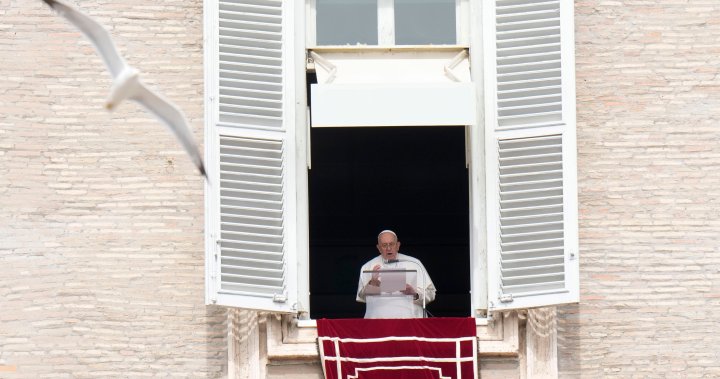Vatican formally renounces Discovery Doctrine after decades of Indigenous demands – National | Globalnews.ca
The Vatican on Thursday responded to Indigenous demands and formally repudiated the “Doctrine of Discovery,” the theories backed by 15th-century “papal bulls” that legitimized the colonial-era seizure of Indigenous lands and form the basis of some property law today.
A Vatican statement said the 15th-century papal bulls, or decrees, “did not adequately reflect the equal dignity and rights of Indigenous peoples” and have never been considered expressions of the Catholic faith.
It said the documents had been “manipulated” for political purposes by colonial powers “to justify immoral acts against Indigenous peoples that were carried out, at times, without opposition from ecclesial authorities.”
Read more:
Papal apology sparks calls to renounce 500-year-old Doctrine of Discovery
The statement, from the Vatican’s development and education offices, said it was right to “recognize these errors,” acknowledge the terrible effects of colonial-era assimilation policies on Indigenous peoples and ask for their forgiveness.
The statement was a response to decades of Indigenous demands for the Vatican to formally rescind the papal bulls that provided the Portuguese and Spanish kingdoms the religious backing to expand their territories in Africa and the Americas for the sake of spreading Christianity.
Those decrees underpin the “Doctrine of Discovery,” a legal concept coined in a 1823 U.S. Supreme Court decision that has come to be understood as meaning that ownership and sovereignty over land passed to Europeans because they “discovered” it.

It was cited as recently as a 2005 Supreme Court decision involving the Oneida Indian Nation written by the late Justice Ruth Bader Ginsburg.
During Pope Francis’ 2022 visit to Canada, during which he apologized to Indigenous peoples for the residential school system that forcibly removed Indigenous children from their homes, he was met with demands for a formal repudiation of the papal bulls.
Two Indigenous women unfurled a banner at the altar of the National Shrine of Sainte-Anne-de-Beaupré on July 29 that read: “Rescind the Doctrine” in bright red and black letters. The protesters were escorted away and the Mass proceeded without incident, though the women later marched the banner out of the basilica and draped it on the railing.
In the statement, the Vatican said: “In no uncertain terms, the Church’s magisterium upholds the respect due to every human being. The Catholic Church therefore repudiates those concepts that fail to recognize the inherent human rights of Indigenous peoples, including what has become known as the legal and political “doctrine of discovery.”
Read more:
Indigenous leader says Pope Francis visit leaves room for reconciliation and change
The Vatican offered no evidence that the three 15th-century papal bulls (Dum Diversas in 1452, Romanus Pontifex in 1455 and Inter Caetera in 1493) had themselves been formally abrogated, rescinded or rejected, as Vatican officials have often said.
But it cited a subsequent bull, Sublimis Deus in 1537, that reaffirmed that Indigenous peoples shouldn’t be deprived of their liberty or the possession of their property, and were not to be enslaved.
It was significant that the repudiation of the “Doctrine of Discovery” came during the pontificate of history’s first Latin American pope. The Argentine Francis, who even before the Canadian trip, had apologized to Indigenous peoples in Bolivia in 2015 for the crimes of the colonial-era conquest of the Americas. It was issued while he was in the hospital Thursday with a respiratory infection.

Cardinal José Tolentino de Mendonça, prefect of the Vatican’s culture office, said the statement was a reflection of the Vatican’s dialogue with Indigenous peoples.
“This Note is part of what we might call the architecture of reconciliation and also the product of the art of reconciliation, the process whereby people commit to listening to each other, to speaking to each other and to growth in mutual understanding,” he said in a statement.
© 2023 The Canadian Press
For all the latest world News Click Here




